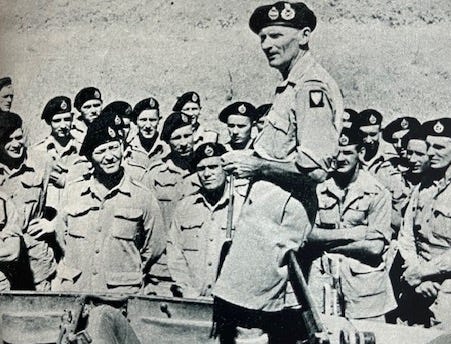Go ahead, call the cops ... General Monty wasn't very nice
By DAVID MYTON
My Uncle Bruce, my mother’s brother, was a quiet, calm and intelligent man who was held in some reverence by the rest of the family … including, especially, me.
Bruce had served in World War 2 as a combat infantry soldier with the British Army’s XXX Corps, landing under enemy fire at Sword Beach in Normandy on June 6, 1944. He went on to serve on active duty until the war’s end in May, 1945.
During those few months Bruce experienced some nasty fighting in France, Belgium, Holland and Germany.
Remarkably, he was never physically wounded – “it was just good luck”, he would say, “no skill involved, lad”. He was a Yorkshire man.
Only one thing got Bruce wound up when it came to conversations about the war - and that was any criticism of his former Commander-in-Chief, General - later Field Marshall - Bernard Montgomery, in charge of 21st Army Group.
It’s easy to criticise Monty. He didn’t play nicely with American and other Allied commanders, including some in the British Army, and he could be tactless, vain and arrogant, and so on.
But such criticisms always bring to my mind a line from a Tom Waits song … “go ahead, call the cops” (Hold On).
What do people expect? Nice guys don’t win wars. Being the boss of an army in combat must be one of the toughest gigs on the planet.
In World War Two the whole deal was enormously magnified. It was a bitter and a vicious war. German commanders such as Rommel, Guderian, and Manstein weren’t exactly the shy and retiring kind. They were as tough and ruthless as they come.
Monty was no kind of Patton or Wingate. He wasn’t a blood and guts maverick, and neither was he an unconventional innovator.
His command methods were centred on winning big set-piece battles, in large part by gaining the trust and confidence of his soldiers - but also training them hard and long so that they knew their role in the fight to come. And by employing lots of artillery.
For my Uncle Bruce, all of Monty’s perceived faults could be overlooked because, in Bruce’s experience, Monty actually cared about the welfare of his soldiers.
Bruce would say … “We knew who he was. He made it clear what he wanted from us, and he did his best to ensure that the Army took care of us.”
Monty also took time to visit soldiers in forward areas and where possible prioritise their needs - things like ensuring the mail from home got through, food and drink were available, and that there were plenty of weapons and ammo to do the job.
And that, should the worse happen, their bodies would be reverently treated and respectfully interred.
This wasn’t all altruism from Monty - it was also realism, a tactic
Writing in his 1958 autobiography The Memoirs of Field Marshal Viscount Montgomery of Alamein, published in 1958, Monty says it is essential to understand that battles “are won in the hearts of soldiers”.
“When Britain goes to war, the ranks of her armed forces are filled with men [they were mostly men in those days] from civil life who are not soldiers, sailors or airmen by profession and who never wanted to be. The young man today reads the newspapers, he goes to the cinema, and he sees how people live and behave in other countries,” he writes.
“He has the radio, he has the television, his visual world is therefore extensive and he can now measure his everyday environment in a way impossible in the Victorian era. He is daily taking in information and relating it to himself.
“He is definitely prepared to criticize and he wants to know what’s going on and what you want him to do, and why, and when. He wants to know that, in the doing of it, his best interests will be absolutely secure in your hands.”
The British soldier, he says, “responds to leadership in a most remarkable way and once you have won his heart he will follow you anywhere.”
Monty made a priority of good communication and care for his soldiers not out of sentimentality, or because he was a gregarious, warm-hearted chap. He did it as a tactic - these men would fight better if they were kept in the loop. For Monty, it was a win-win situation.
My Uncle Bruce fought through, and survived, some of the toughest battles of World War Two. He had absolute loyalty to Monty.
Uncle Bruce wasn’t naive or stupid. He knew Monty’s care and attention was driven by the practical consideration of the best way to win battles, or to not to lose them.
It didn't make any difference to Bruce because he believed Monty’s generalship kept him alive. And for that he was grateful to his last days.
Reference
The Memoirs of Field-Marshall The Viscount Montgomery Of Alamein, KG, The Companion Book Club, London, 1958




